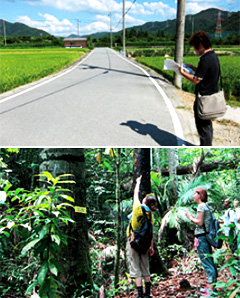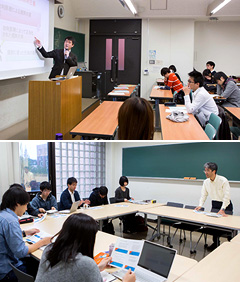Course of Human Sciences
Investigating and analyzing the topics of mankind,
societies, and the environment
Sociology is a discipline that studies contemporary social systems and the consciousness and behavior of the people living in these societies, and attempts to uncover and solve various social problems.
Geography is a discipline that explains the relationship between people and the different environments in which people live, such as cities and villages, in terms of, for example, production, transportation, or regional image.
Philosophy and Philosophical anthropology are disciplines that reconsider problems paid little attention to or often taken to be settled and, upon careful examination of them, try to get closer to reasonable solutions.
Examples of Graduate Thesis Topics
- Structure and Current Trends of Regional Migration by Highly Qualified Graduates for School or Employment
- Changes in Brewery Employment and Passing Down of Brewing Techniques
- Conscious Experience and Qualia
| [Majors] | ê Sociology ê Geography ê Philosophy and Philosophical anthropology ê 人間科学コース共通 |
|---|
Sociology
The discipline known as sociology is a specialty that investigates and studies contemporary societies and the consciousness and behavior of the people living in these societies, and attempts to uncover and solve various social problems. The sociology major focuses on education and research using the following basic methods.
Educational goals:
(1) Learning how to collect and organize data on people and societies, and training in data analysis,
(2) Learning multifaceted micro and macro viewpoints, and acquiring analytical skills for accurately understanding people and societies, and
(3) Developing the necessary behavior, management, and communication skills for sharing knowledge with people and achieving problem resolution. Nurturing talent:
(1) Personnel who possess the skill of making assessments based on objective data, and are active in government, public service, or business;
(2) "Ordinary citizens" who are able to cooperate with others to solve problems;
(3) Graduate students who have a firm foundation in sociology; and
(4) Sociologists who qualify for a "Certificate of Social Research" by an association providing certificates in social research, and practice social research.
The courses "Practice in Sociological Research," "Sociological Research Methods," and "Social Statistics" will teach you techniques for data collection and analysis, and verifiable sociological methods. Both lectures and exercises teach you theoretical results explained from a viewpoint of the causes and effects of social phenomena. With this foundation, you will research a topic of your choice in the graduation thesis. The Sociology major is looking for students who have a lively interest in events and human behavior in societies, students who believe that it is important to know things objectively, and students with a positive attitude toward matters pertaining to people.
Geography
What comes to mind when you hear "geography"? Names of major cities in different countries, mineral production centers, types of agricultural products produced in different regions, Köppen's classification of climate: Certainly, these are important facts when studying "geography." The most important aspect of the "geography" studied in college, however, is the theory, the way of thinking, and most of all, the imagination needed to understand the connections between these facts. "Why are factories producing automotive products concentrated in this region?" "Why are pumpkins sold in Japanese supermarkets grown in Tonga?" and "Why is my Kanazawa different from your Kanazawa?" Answering such questions requires not just facts, but a rich and flexible imagination. Such an imagination springs not just from reading and investigating documentary sources, but also from going out into the field to see the lay of the land with your own eyes, to hear the voices of the people there with your own ears, and to consider about those phenomena in your own head.
"Geography" is a discipline that seeks a comprehensive understanding of the relationship between people and environment through such fieldwork. Therefore, besides lectures and exercises, there is a great emphasis on "practice in geographical investigation" carried out in the field. A one-week practice in geographical investigation during the summer vacations of your sophomore and junior years will likely introduce you to a new world. We are waiting for people who seek such encounters.
Philosophy and Philosophical anthropology
Philosophy and philosophical anthropology are disciplines that dare to ask the question "Why?" about matters usually taken to be obvious and not considered as problems, and take these as serious ones.
Philosophical anthropology, coupled with the discipline of philosophy, specifically investigates human beings' nature itself and their place in nature. Therefore, philosophy and philosophical anthropology also handle issues of bioethics and of environmental ethics. Philosophy emphasizes, above all else, logical lucidity to give clearly defined boundaries to questioned matters. This is because there are proper procedures for handling problems, just like set moves in Shogi and Go.
The Philosophy and Philosophical anthropology major in the School of Humanities of Kanazawa University aims first of all to empower students by developing their ability to think matters following logical procedure rigorously. The topics of lectures extend from the pre-Socratic Greek philosophers to topical problems in modern philosophy, e.g. "Do robots have hearts?" in order for students to approach various philosophical problems and deepen their understanding of them.
人間科学コース共通
I have the lectures and seminars of Social Informatics.




